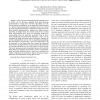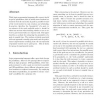769 search results - page 35 / 154 » Analysis of recursively parallel programs |
ICLP
1997
Springer
14 years 1 months ago
1997
Springer
We provide a method whereby, given mode and (upper approximation) type information, we can detect procedures and goals that can be guaranteed to not fail (i.e., to produce at leas...
IEEECGIV
2009
IEEE
14 years 3 months ago
2009
IEEE
—There are several methods used for plotting curves in CAGD, e.g., by directly computing their basis functions (polynomials) or using their recursive algorithms. For the former m...
JLP
2000
13 years 8 months ago
2000
interpretation. In the context of stream parallelism, this analysis identi es an amount of input data for which predicate execution can safely wait without danger of introducing de...
IPPS
1999
IEEE
14 years 1 months ago
1999
IEEE
By managing network resources at compile time, the compiled communication technique greatly improves the communication performance for communication patterns that are known at com...
PLDI
1990
ACM
14 years 28 days ago
1990
ACM
While logic programming languages offer a great deal of scope for parallelism, there is usually some overhead associated with the execution of goals in parallel because of the wor...


